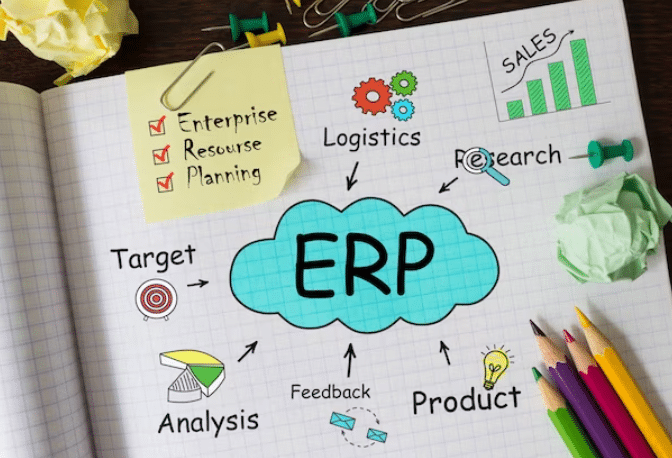Enterprise Resource Planning (ERP) for Small Businesses: Streamlining Operations and Boosting Efficiency
Small businesses, despite their size, face a multitude of operational challenges. To overcome these hurdles and thrive in today’s competitive landscape, many small businesses are turning to ERP systems. In this article, we’ll explore how ERP solutions can benefit small businesses, the key features to consider, and how to implement ERP effectively.

1. Introduction
ERP, or Enterprise Resource Planning, is a comprehensive software solution designed to integrate and streamline various business processes and functions within an organization. While ERP systems have traditionally been associated with large enterprises, they have evolved to cater to the unique needs of small businesses.
2. Benefits of ERP for Small Businesses
Small businesses can reap several benefits from implementing ERP systems:
- Efficiency: ERP automates routine tasks, reducing manual effort and increasing efficiency. This enables small businesses to do more with fewer resources.
- Data Accuracy: Real-time data and centralized information sources improve data accuracy, leading to better decision-making.
- Cost Savings: ERP helps manage resources more effectively, leading to reduced operational costs.
- Scalability: Small businesses can grow without the constraints of their ERP system, ensuring it remains effective as they expand.
- Competitive Advantage: Efficient operations, quick responses to market changes, and improved customer service provide a competitive edge.
3. Key Features of ERP for Small Businesses
When selecting an ERP system for a small business, it’s essential to consider these key features:
- Affordability: Look for ERP solutions that offer affordable pricing models tailored to small business budgets.
- Ease of Use: The system should be user-friendly, requiring minimal training for employees.
- Scalability: Ensure the ERP system can grow with the business as it expands.
- Integration: It should seamlessly integrate with existing software and systems.
- Cloud-Based: Consider cloud-based ERP for flexibility and accessibility.
4. Implementing ERP for Small Businesses
Effective implementation of an ERP system involves:
- Needs Assessment: Identify the specific requirements and goals of the small business.
- Data Migration: Migrate existing data accurately to the new system.
- Training: Provide adequate training for employees to ensure proficient usage.
- Testing: Conduct thorough testing to identify and resolve any issues before full deployment.
5. Selecting the Right ERP Solution
Choosing the right ERP solution is a critical decision for small businesses. Factors to consider include scalability, affordability, industry-specific features, integration capabilities, and vendor support. It’s essential to align the ERP solution with the specific needs and goals of the small business.
6. Conclusion
In conclusion, ERP systems are no longer exclusive to large enterprises. Small businesses can leverage ERP solutions to streamline operations, reduce costs, and gain a competitive advantage in their respective markets. The key is to carefully evaluate their needs, select the right ERP solution, and implement it effectively. As small businesses continue to adapt and grow, ERP systems provide an invaluable tool for achieving operational excellence and sustainable success.
Small businesses that embrace ERP systems experience enhanced control over their operations, improved resource management, and better decision-making capabilities. Moreover, the benefits of data accuracy and efficiency significantly contribute to customer satisfaction and loyalty, which are vital for the growth of small businesses.
By implementing ERP solutions, small businesses can better allocate their resources, streamline their processes, and adapt to market changes. This operational flexibility is essential in today’s fast-paced business environment, where responsiveness and efficiency can make or break a company’s success.
However, it’s important to acknowledge that ERP implementation for small businesses may come with some challenges. These challenges can include resistance to change among employees, data migration complexities, and the need for thorough training. Recognizing and addressing these obstacles is crucial for the smooth adoption and utilization of ERP systems.
Furthermore, selecting the right ERP solution is a pivotal decision. Small businesses should assess their current and future needs, ensuring that the chosen ERP system aligns with their specific industry requirements and growth potential. Affordability and scalability are essential factors to consider, as the goal is to invest in a solution that offers long-term benefits without straining the budget.
In conclusion, ERP systems are not exclusive to large corporations, and they have a valuable role to play in the growth and success of small businesses. By effectively implementing the right ERP solution, small enterprises can enhance their efficiency, reduce costs, and remain competitive in their industries. As the business landscape continues to evolve, ERP solutions will continue to serve as essential tools for small businesses aiming to achieve operational excellence and sustainable growth.